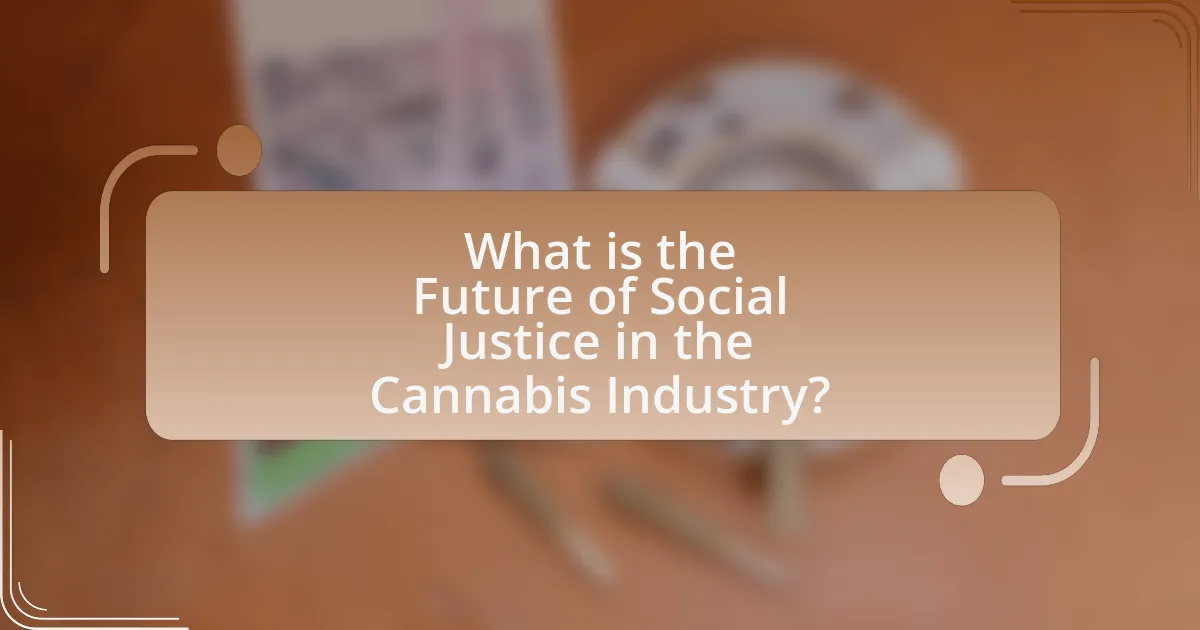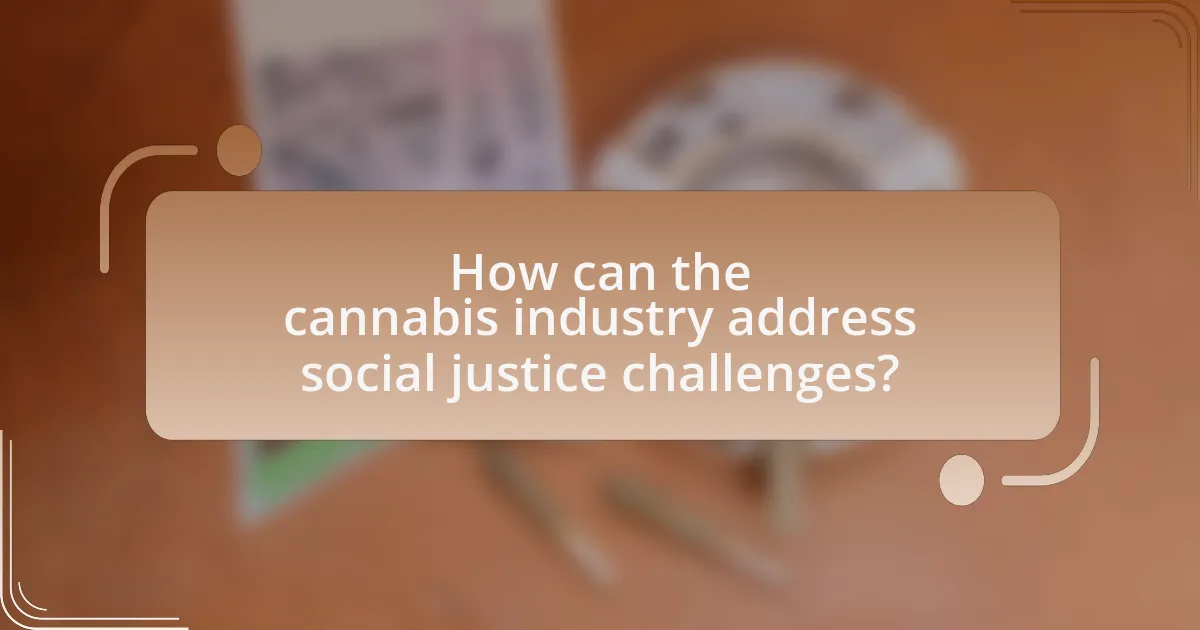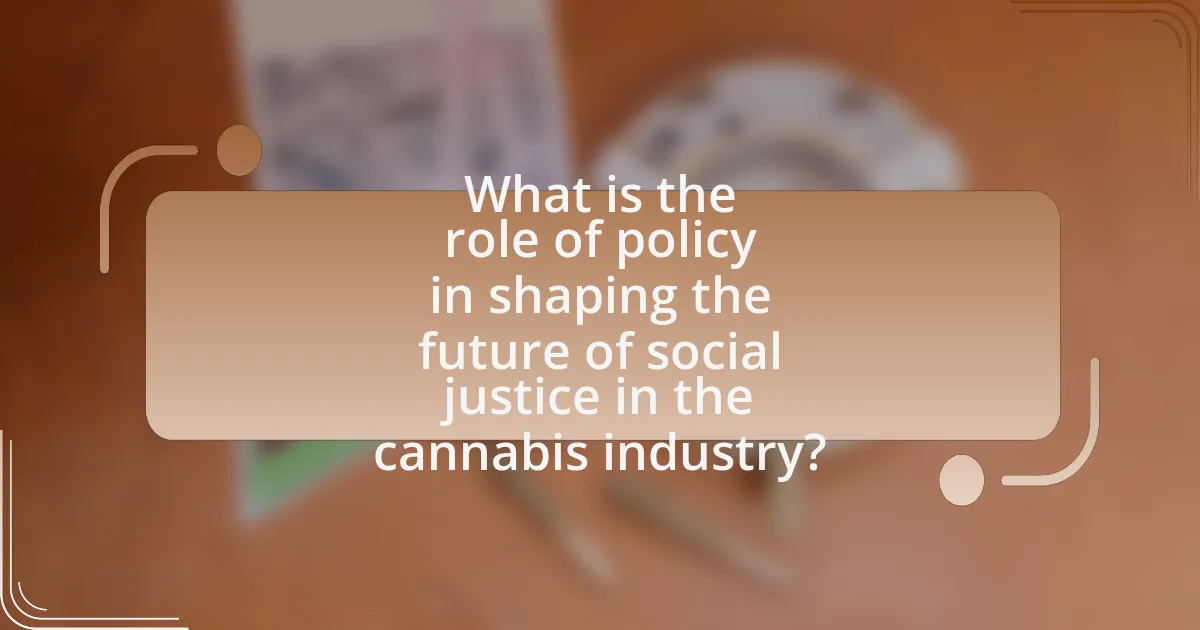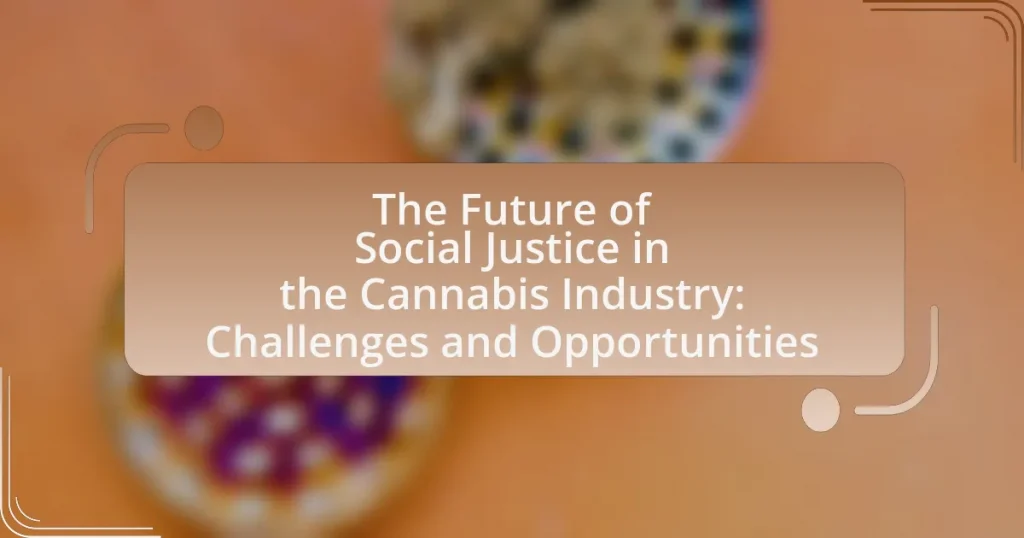The article examines the future of social justice in the cannabis industry, highlighting the importance of equitable access, expungement of past convictions, and economic opportunities for marginalized communities. It discusses the historical injustices stemming from the War on Drugs, which disproportionately affected communities of color, and the intersection of social justice movements with cannabis reform efforts. Key challenges such as systemic inequities, lack of access to capital, and regulatory barriers are addressed, alongside opportunities for advancing social equity through community initiatives and policy reforms. The article emphasizes the role of advocacy groups and the impact of local and state policies on promoting social justice within the cannabis sector.

What is the Future of Social Justice in the Cannabis Industry?
The future of social justice in the cannabis industry is likely to focus on equitable access, expungement of past convictions, and economic opportunities for marginalized communities. As legalization spreads, states are increasingly implementing policies aimed at rectifying the injustices of previous drug laws, such as the 2020 Illinois Cannabis Regulation and Tax Act, which allocates a portion of tax revenue to communities disproportionately affected by the War on Drugs. Additionally, initiatives like social equity programs are being established to ensure that individuals from these communities can participate in the legal cannabis market, addressing historical disparities. These developments indicate a growing recognition of the need for social justice within the industry, driven by advocacy and legislative changes.
How is social justice defined within the context of the cannabis industry?
Social justice within the context of the cannabis industry is defined as the equitable distribution of resources, opportunities, and benefits related to cannabis legalization, particularly addressing the historical injustices faced by marginalized communities disproportionately affected by cannabis prohibition. This definition emphasizes the need for policies that rectify past harms, such as arrest records and economic disparities, by promoting inclusive access to the cannabis market and ensuring that communities most impacted by the war on drugs can participate in and benefit from the legal cannabis economy. For instance, studies show that states implementing social equity programs have seen increased participation from minority-owned businesses in the cannabis sector, highlighting the importance of targeted initiatives to foster fairness and inclusion.
What historical injustices have shaped the current landscape of cannabis legalization?
Historical injustices, particularly the criminalization of cannabis, have significantly shaped the current landscape of cannabis legalization. The War on Drugs, initiated in the 1970s, disproportionately targeted communities of color, leading to mass incarceration and social stigmatization of cannabis users. For instance, despite similar usage rates, Black individuals were nearly four times more likely to be arrested for cannabis-related offenses compared to white individuals, as reported by the American Civil Liberties Union in 2020. This systemic discrimination has created lasting socio-economic disparities that persist today, influencing the ongoing discussions around equity and justice in cannabis legalization efforts.
How do social justice movements intersect with cannabis reform efforts?
Social justice movements intersect with cannabis reform efforts by advocating for the decriminalization of cannabis and addressing the disproportionate impact of cannabis prohibition on marginalized communities. These movements highlight the historical injustices faced by individuals, particularly people of color, who have been disproportionately arrested and incarcerated for cannabis-related offenses. For instance, a 2020 report from the American Civil Liberties Union revealed that Black individuals are nearly four times more likely to be arrested for cannabis possession than white individuals, despite similar usage rates. This intersection emphasizes the need for equitable policies that not only legalize cannabis but also rectify past harms through measures such as expungement of criminal records and reinvestment in affected communities.
What are the key challenges facing social justice in the cannabis industry?
The key challenges facing social justice in the cannabis industry include systemic inequities, lack of access to capital for marginalized communities, and the ongoing criminalization of cannabis-related activities. Systemic inequities manifest in the disproportionate impact of cannabis prohibition on communities of color, which have historically faced higher arrest rates despite similar usage rates compared to white populations. According to the American Civil Liberties Union, Black individuals are nearly four times more likely to be arrested for cannabis possession than white individuals, highlighting the racial disparities in enforcement. Additionally, the legal cannabis market often requires significant financial investment, creating barriers for those from economically disadvantaged backgrounds who seek to enter the industry. This lack of access to capital further perpetuates economic inequality. Lastly, despite legalization efforts in many states, individuals with prior cannabis convictions continue to face barriers to employment and housing, underscoring the need for comprehensive policy reform to address these injustices.
How do regulatory frameworks impact social equity in cannabis?
Regulatory frameworks significantly impact social equity in cannabis by determining access to the market and the distribution of resources. These frameworks can either promote inclusivity by providing opportunities for marginalized communities or perpetuate existing inequalities through restrictive licensing processes and high barriers to entry. For example, states that implement social equity programs, such as California’s equity licensing provisions, aim to rectify past injustices by prioritizing applicants from communities disproportionately affected by cannabis prohibition. Conversely, jurisdictions with stringent regulations and high fees can limit participation from those communities, thereby reinforcing economic disparities. Studies indicate that equitable access to cannabis markets can lead to improved economic outcomes for disadvantaged groups, highlighting the critical role of regulatory design in fostering social equity.
What barriers do marginalized communities face in accessing the cannabis market?
Marginalized communities face significant barriers in accessing the cannabis market, primarily due to systemic inequalities, financial constraints, and regulatory challenges. These communities often lack the capital necessary to enter the market, as studies indicate that access to funding for minority-owned businesses is disproportionately lower compared to their white counterparts. Additionally, the complex regulatory landscape, which varies by state, can create obstacles for individuals unfamiliar with legal requirements, further hindering their ability to participate. Historical injustices, such as the criminalization of cannabis use in these communities, also contribute to a lack of trust in the industry and its institutions, making it difficult for marginalized individuals to engage fully in the market.
What opportunities exist for advancing social justice in the cannabis industry?
Opportunities for advancing social justice in the cannabis industry include equitable access to licenses, community reinvestment initiatives, and expungement of criminal records related to cannabis offenses. Equitable access to licenses can help rectify historical injustices by allowing individuals from marginalized communities to participate in the industry, which has been shown to be disproportionately affected by the War on Drugs. Community reinvestment initiatives, such as funding for education and health services in areas most impacted by cannabis prohibition, can further promote social equity. Additionally, expungement programs can alleviate the long-term consequences of past cannabis-related convictions, enabling individuals to reintegrate into society and access employment opportunities. These measures collectively contribute to a more just and inclusive cannabis industry.
How can community-based initiatives promote equity in cannabis access?
Community-based initiatives can promote equity in cannabis access by directly addressing barriers faced by marginalized groups in obtaining cannabis products. These initiatives often focus on education, advocacy, and resource allocation to ensure that underserved communities have the same opportunities as others. For example, programs that provide legal assistance, financial support for cannabis business startups, and educational workshops about cannabis laws can empower individuals from these communities. Research indicates that states with social equity programs, such as California’s Bureau of Cannabis Control, have seen increased participation from minority-owned businesses in the cannabis market, demonstrating the effectiveness of targeted community efforts in promoting equitable access.
What role do advocacy groups play in shaping cannabis policy for social justice?
Advocacy groups play a crucial role in shaping cannabis policy for social justice by mobilizing public opinion, influencing legislation, and promoting equitable practices within the cannabis industry. These organizations often highlight the disproportionate impact of cannabis prohibition on marginalized communities, advocating for policies that address historical injustices, such as expungement of criminal records and equitable access to cannabis business opportunities. For instance, the Drug Policy Alliance has been instrumental in pushing for reforms that prioritize social equity, demonstrating that advocacy efforts can lead to significant legislative changes, such as the inclusion of social equity provisions in cannabis legalization laws in states like California and Illinois.

How can the cannabis industry address social justice challenges?
The cannabis industry can address social justice challenges by implementing equitable policies that prioritize the inclusion of marginalized communities in the legal cannabis market. This includes creating pathways for individuals with prior cannabis-related convictions to participate in the industry, such as expungement programs and access to funding for minority-owned businesses. For instance, states like California have established grant programs specifically aimed at supporting social equity applicants, which helps to rectify historical injustices related to cannabis prohibition. Additionally, the industry can promote diversity in hiring practices and leadership roles, ensuring that the workforce reflects the communities most affected by past cannabis laws. By actively engaging in community outreach and education, the cannabis industry can foster a more inclusive environment that addresses the systemic inequities faced by these communities.
What strategies can be implemented to enhance equity in cannabis licensing?
To enhance equity in cannabis licensing, jurisdictions can implement strategies such as prioritizing applications from individuals impacted by past cannabis criminalization, establishing grant programs for minority-owned businesses, and creating mentorship initiatives that connect experienced operators with new entrants from marginalized communities. Research indicates that states like California and Illinois have adopted social equity programs that allocate a percentage of licenses to applicants from communities disproportionately affected by the War on Drugs, demonstrating a commitment to rectifying historical injustices. Additionally, providing financial assistance and reducing application fees can further lower barriers for underrepresented groups, fostering a more inclusive cannabis industry.
How can mentorship programs support underrepresented entrepreneurs in cannabis?
Mentorship programs can support underrepresented entrepreneurs in cannabis by providing access to industry knowledge, networking opportunities, and financial resources. These programs often connect aspiring entrepreneurs with experienced mentors who can offer guidance on navigating regulatory challenges, understanding market dynamics, and developing business strategies tailored to the cannabis sector. For instance, a study by the National Cannabis Industry Association found that mentorship significantly increases the likelihood of business success, particularly for those from marginalized backgrounds, by fostering a supportive environment that encourages innovation and resilience.
What best practices can be adopted to ensure fair hiring in the cannabis sector?
To ensure fair hiring in the cannabis sector, organizations should implement structured interview processes that focus on skills and qualifications rather than personal characteristics. This practice minimizes bias and promotes equal opportunity. Research indicates that structured interviews can improve the reliability and validity of hiring decisions, as they standardize the evaluation criteria across all candidates. Additionally, companies should actively seek to diversify their applicant pools by partnering with organizations that support underrepresented communities in the cannabis industry. This approach not only enhances inclusivity but also aligns with social justice goals, as highlighted by the National Cannabis Industry Association, which emphasizes the importance of equitable access to employment in the cannabis sector.
How can education and awareness contribute to social justice in cannabis?
Education and awareness can significantly contribute to social justice in cannabis by informing communities about their rights and the legal landscape surrounding cannabis use and cultivation. Increased knowledge empowers individuals to advocate for equitable policies, challenge discriminatory practices, and participate in the legal cannabis market. For instance, research from the American Civil Liberties Union indicates that Black individuals are 3.64 times more likely to be arrested for cannabis possession than white individuals, highlighting the need for targeted education to address these disparities. Furthermore, educational programs can promote understanding of the historical injustices related to cannabis prohibition, fostering a more inclusive dialogue about reparative measures and equitable access to the industry.
What educational resources are available to inform communities about cannabis rights?
Educational resources available to inform communities about cannabis rights include legal aid organizations, educational websites, community workshops, and advocacy groups. Legal aid organizations, such as the National Organization for the Reform of Marijuana Laws (NORML), provide information on cannabis laws and rights. Educational websites like Leafly and Weedmaps offer articles and guides on cannabis legislation. Community workshops often hosted by local advocacy groups, such as the Drug Policy Alliance, educate residents on their rights and the legal landscape surrounding cannabis. These resources are crucial for empowering communities to understand and navigate cannabis rights effectively.
How can public awareness campaigns shift perceptions about cannabis and social justice?
Public awareness campaigns can shift perceptions about cannabis and social justice by educating the public on the historical injustices associated with cannabis prohibition and its disproportionate impact on marginalized communities. These campaigns often highlight statistics, such as the fact that Black individuals are nearly four times more likely to be arrested for cannabis possession than white individuals, despite similar usage rates. By disseminating this information through various media channels, public awareness campaigns can foster empathy and understanding, ultimately leading to a more informed public that advocates for equitable policies in the cannabis industry.

What is the role of policy in shaping the future of social justice in the cannabis industry?
Policy plays a crucial role in shaping the future of social justice in the cannabis industry by establishing regulations that address historical injustices and promote equitable access. Effective policies can rectify past harms caused by criminalization, such as disproportionate incarceration rates among marginalized communities, by implementing measures like expungement of criminal records and prioritizing minority-owned businesses in licensing processes. For instance, states like California have enacted laws that include social equity programs aimed at supporting individuals from communities disproportionately affected by cannabis prohibition, thereby fostering economic opportunities and reducing systemic inequalities. These policy frameworks not only influence the operational landscape of the cannabis industry but also serve as a mechanism for advancing social justice objectives, ensuring that the benefits of legalization are shared more equitably across society.
How do local and state policies impact social equity in cannabis?
Local and state policies significantly impact social equity in cannabis by determining access to the market, regulatory frameworks, and funding for community reinvestment. For instance, states that implement social equity programs, such as California’s Bureau of Cannabis Control, provide support for individuals from communities disproportionately affected by cannabis prohibition, including reduced licensing fees and technical assistance. Research indicates that states with robust social equity initiatives, like Illinois, have seen increased participation from minority-owned businesses in the cannabis sector, which helps to address historical injustices. Furthermore, local policies can either facilitate or hinder equitable access to cannabis licenses, influencing who can participate in the industry and how benefits are distributed within communities.
What examples exist of successful social equity programs in cannabis legislation?
Successful social equity programs in cannabis legislation include California’s Cannabis Equity Program and Illinois’ Cannabis Regulation and Tax Act. California’s program, initiated in 2018, provides grants and technical assistance to individuals from communities disproportionately affected by the War on Drugs, aiming to create pathways for ownership and employment in the cannabis industry. Illinois’ program, established in 2019, allocates a portion of cannabis tax revenue to support social equity applicants, offering financial assistance and priority licensing to those impacted by past cannabis-related convictions. Both programs demonstrate a commitment to addressing historical injustices and fostering inclusivity in the cannabis market.
How can policymakers ensure that social justice is prioritized in future cannabis laws?
Policymakers can ensure that social justice is prioritized in future cannabis laws by implementing equitable licensing practices and reinvesting tax revenues into communities disproportionately affected by cannabis prohibition. For instance, states like Illinois have established social equity programs that provide financial assistance and training for individuals from marginalized communities to enter the cannabis industry. Additionally, data from the American Civil Liberties Union indicates that Black individuals are nearly four times more likely to be arrested for cannabis-related offenses than white individuals, highlighting the need for laws that address these disparities. By focusing on restorative justice measures and community reinvestment, policymakers can create a more equitable cannabis landscape.
What are the implications of federal legalization for social justice in cannabis?
Federal legalization of cannabis has significant implications for social justice, primarily by addressing the disproportionate impact of cannabis prohibition on marginalized communities. Legalization can lead to the expungement of criminal records for individuals previously convicted of cannabis-related offenses, which disproportionately affects people of color. According to the American Civil Liberties Union, Black individuals are nearly four times more likely to be arrested for cannabis possession than white individuals, despite similar usage rates. Furthermore, federal legalization can facilitate equitable access to the cannabis industry for underrepresented groups through initiatives like social equity programs, which aim to provide resources and support for minority-owned businesses. This shift not only promotes economic opportunities but also helps to rectify historical injustices associated with the War on Drugs.
How might federal policies address past injustices related to cannabis prohibition?
Federal policies can address past injustices related to cannabis prohibition by implementing measures such as expunging criminal records for non-violent cannabis offenses, providing financial support for communities disproportionately affected by prohibition, and ensuring equitable access to the legal cannabis market. Expungement can rectify the legal status of individuals previously convicted, as evidenced by states like California, which has enacted laws to clear records for over 200,000 individuals. Financial support can include grants and loans aimed at minority-owned cannabis businesses, addressing the economic disparities created by prohibition. Additionally, policies that promote diversity in licensing and ownership within the cannabis industry can help rectify historical inequities, as seen in New Jersey’s social equity programs designed to prioritize applicants from communities impacted by the War on Drugs.
What challenges could arise from federal legalization concerning social equity?
Federal legalization of cannabis could lead to challenges in achieving social equity, primarily due to the potential for large corporations to dominate the market. This market consolidation may marginalize small, minority-owned businesses that historically faced barriers to entry. Additionally, disparities in access to capital and resources could widen, as established companies may have more financial leverage to navigate regulatory complexities. Research from the Brookings Institution indicates that without intentional policies to support underrepresented communities, the benefits of legalization may disproportionately favor affluent individuals and corporations, undermining the original intent of promoting social equity in the cannabis industry.
What practical steps can individuals take to support social justice in the cannabis industry?
Individuals can support social justice in the cannabis industry by advocating for equitable policies, engaging in community education, and supporting minority-owned cannabis businesses. Advocating for equitable policies involves lobbying for legislation that addresses the historical injustices faced by marginalized communities, such as expunging criminal records related to cannabis offenses. Engaging in community education helps raise awareness about the benefits of legalization and the importance of inclusivity in the industry. Supporting minority-owned cannabis businesses can be achieved by purchasing products from these companies, which helps to redistribute wealth and create opportunities for underrepresented groups. These actions contribute to a more just and equitable cannabis industry, addressing the disparities created by past prohibition policies.
How can consumers make informed choices that promote equity in cannabis purchases?
Consumers can make informed choices that promote equity in cannabis purchases by prioritizing products from companies owned by marginalized communities and those that actively support social justice initiatives. Research indicates that minority-owned cannabis businesses often face systemic barriers, and supporting them can help rectify historical injustices. For example, a report by the Minority Cannabis Business Association highlights that only 4% of cannabis businesses are owned by Black individuals, despite disproportionate impacts of cannabis prohibition on these communities. By choosing to purchase from these businesses, consumers can contribute to economic empowerment and equity in the cannabis industry. Additionally, consumers can seek out brands that engage in fair labor practices and reinvest profits into community programs, further promoting social equity.
What actions can community members take to advocate for social justice in cannabis reform?
Community members can advocate for social justice in cannabis reform by engaging in grassroots organizing, educating themselves and others about the impacts of cannabis prohibition, and lobbying for equitable policies. Grassroots organizing allows individuals to mobilize support for reform initiatives, while education fosters awareness of the historical injustices faced by marginalized communities due to cannabis laws. Lobbying efforts can target local and state legislators to promote legislation that addresses social equity, such as expungement of criminal records for cannabis-related offenses and equitable access to the cannabis industry for those disproportionately affected by past policies. According to a report from the American Civil Liberties Union, Black individuals are nearly four times more likely to be arrested for cannabis possession than white individuals, highlighting the need for reform that addresses these disparities.


